MASLD vs MetALD With Valerie Shin
Chat with MASLD AI

Hi, I am MASLD AI.
Suggested Questions :

MASLD AI 03:37 AM

Valerie Shin, NP from UCLA Health’s Pfleger Liver Institute, hosts a clear, practical overview of MASLD, MASH, and mixed-etiology MET-ALD for the GHAPP MASLD Community Network (sponsored by Madrigal). Through a common patient case, she explains how to recognize steatotic liver disease, why getting an accurate alcohol history matters, and how non-invasive tools (like FibroScan and alcohol biomarkers) help confirm what’s driving liver injury. You’ll hear straightforward guidance on counseling patients: heart-healthy/Mediterranean-style eating, sustainable weight loss, regular aerobic and resistance exercise, and complete alcohol cessation—plus when to consider specialty referral and ongoing surveillance. Perfect for APPs and GI clinicians seeking a simple, patient-centered approach to preventing progression from fatty liver to advanced disease.
Related Podcast
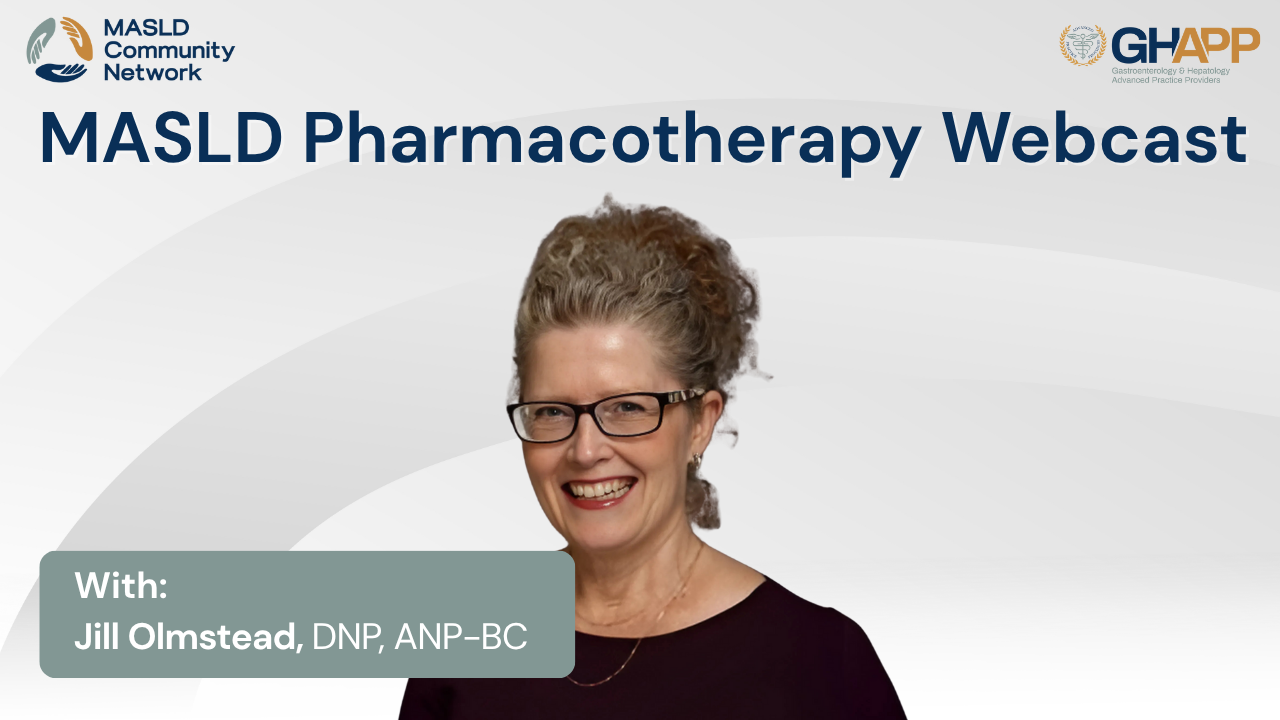
MASLD Pharmacotherapy With Jill Olmstead

Join Jill Olmstead, DNP from Providence Health for a practical, clinician-focused overview of MASLD pharmacotherapy and new treatment horizons for hepatic steatosis. This session in the GHAPP MASLD & MASH Community Network covers the shift in nomenclature, why care must be multidisciplinary (obesity, type 2 diabetes, dyslipidemia, hypertension, cardiovascular risk), and how to stage disease with FIB-4, noninvasive tests, and FibroScan before initiating therapy. Jill reviews lifestyle and weight-loss strategies, GLP-1 receptor agonists—their mechanisms, common GI side effects, and peri-procedure considerations due to delayed gastric emptying—plus where vitamin E and pioglitazone do and don’t fit today. She also walks through practical use of resmetirom for non-cirrhotic MASH with F2–F3 fibrosis (labs to order, monitoring, drug–drug interactions, and setting expectations alongside diet and exercise). If you’re a GI/hepatology clinician, APP, or primary-care partner looking to streamline risk reduction, staging, and evidence-based therapy for MASLD/MASH, this talk delivers step-by-step guidance you can use in clinic today.
Watch Now

LFTs Demystified: A practical guide for APPs

In this GHAPP MASLD Community Network podcast, Jessica Crimaldi, NP, from the Cleveland Clinic, provides practical, real-world insights into interpreting liver function tests (LFTs) in the context of MASLD (metabolic dysfunction-associated steatotic liver disease) and MASH (steatohepatitis). Drawing on over a decade of experience in GI and hepatology, Jessica explains common ALT and AST elevation patterns that should prompt a diagnostic workup, even in asymptomatic patients. She reviews the hepatocellular vs. cholestatic patterns of injury, the value of the R-factor calculator in identifying the likely etiology of liver enzyme abnormalities, and how to differentiate MASH from other liver diseases such as PBC, viral hepatitis, or bile duct obstruction. The episode also addresses key non-liver labs like triglycerides, A1C, and cholesterol, and how they contribute to assessing metabolic risk. Finally, Jessica discusses the role of serial LFT monitoring in evaluating treatment response—highlighting what it means when liver enzyme levels fall and why "normal" LFTs don’t always indicate disease resolution. Whether you're a primary care provider or hepatology specialist, this podcast offers valuable guidance for early detection, risk stratification, and longitudinal monitoring of patients with MASH.
Watch Now
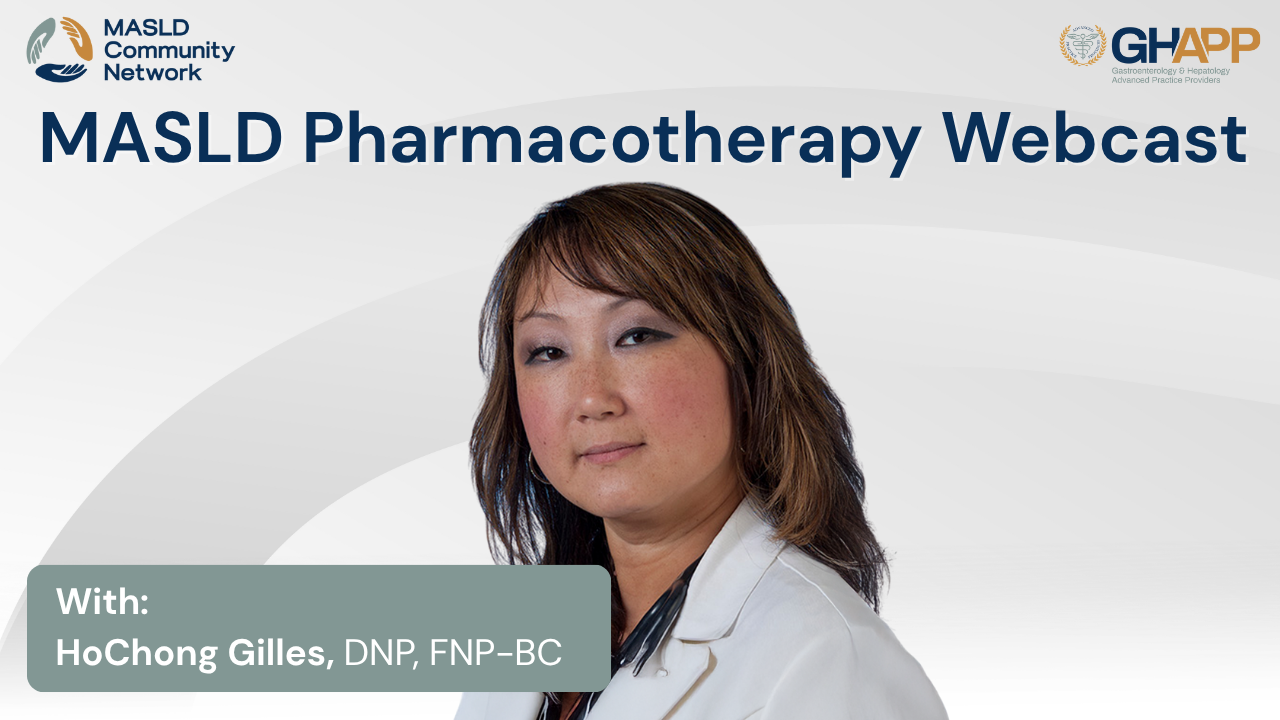
MASLD Pharmacotherapy With HoChong Gilles

In this MASLD Community Network webcast, HoChong Gilles, DNP from the Central Virginia VA Health Care System, provides an in-depth review of pharmacotherapy for MASLD and MASH. The session highlights how management historically focused on lifestyle modification, weight loss, and cardiometabolic risk reduction, and how the treatment landscape shifted in March 2024 with the FDA approval of resmetirom (Rezdiffra)—the first therapy specifically indicated for non-cirrhotic MASH with stage 2–3 fibrosis. HoChong also reviews the evidence and practical use of GLP-1 receptor agonists like semaglutide, including data from the ESSENCE trial, as well as the limited but notable roles of vitamin E and pioglitazone. Key discussion points include drug mechanisms, clinical trial outcomes, real-world safety considerations, drug–drug interactions, and monitoring strategies for patients on therapy. This presentation underscores the importance of integrating lifestyle change with emerging pharmacologic options to improve liver outcomes in patients with MASLD and MASH.
Watch Now
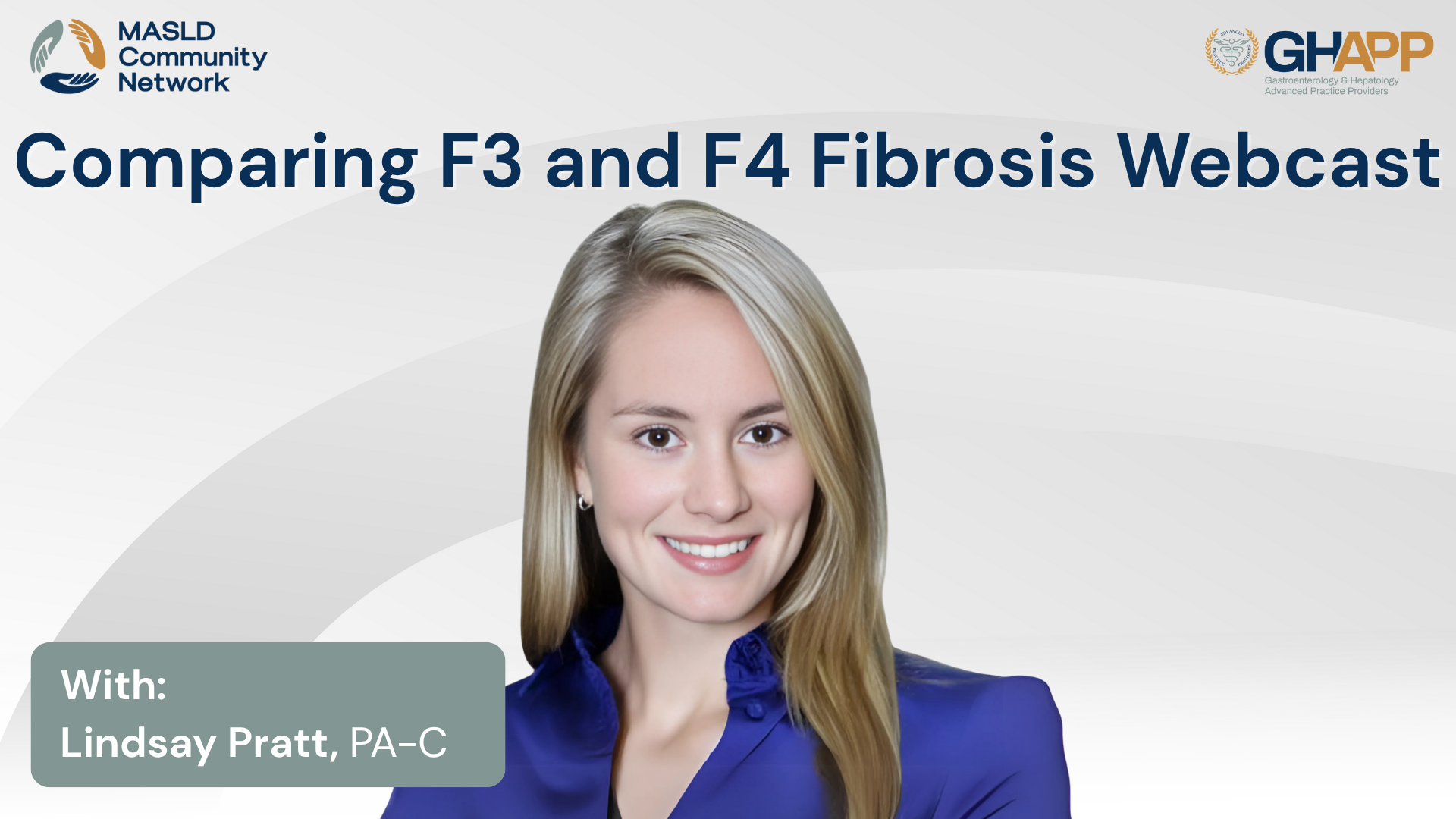
Comparing F3 and F4 Fibrosis With Lindsay Pratt

Join Lindsey Pratt, PA-C from the University of Colorado Liver Transplant Program, for an in-depth clinical comparison of F3 and F4 fibrosis in patients with MASLD (Metabolic Dysfunction–Associated Steatotic Liver Disease) and MASH (Metabolic Dysfunction–Associated Steatohepatitis). Using an identical patient profile with differing non-invasive testing results, Lindsey demonstrates how to accurately stage fibrosis using tools like FIB-4, FibroScan, CAP score, and ELF test—emphasizing when pharmacologic intervention is appropriate and when advanced monitoring becomes critical. This session explores the clinical implications of fibrosis staging, treatment pathways including resmetirom (Rezdiffra), the role of GLP-1 receptor agonists, and practical nutrition and lifestyle strategies. For F4 patients, Lindsey outlines key elements of surveillance for hepatocellular carcinoma (HCC), portal hypertension management, and transplant evaluation. Whether you're in hepatology or primary care, this case-based discussion offers evidence-backed guidance for managing patients across the MASLD/MASH spectrum and preventing liver disease progression.
Watch Now
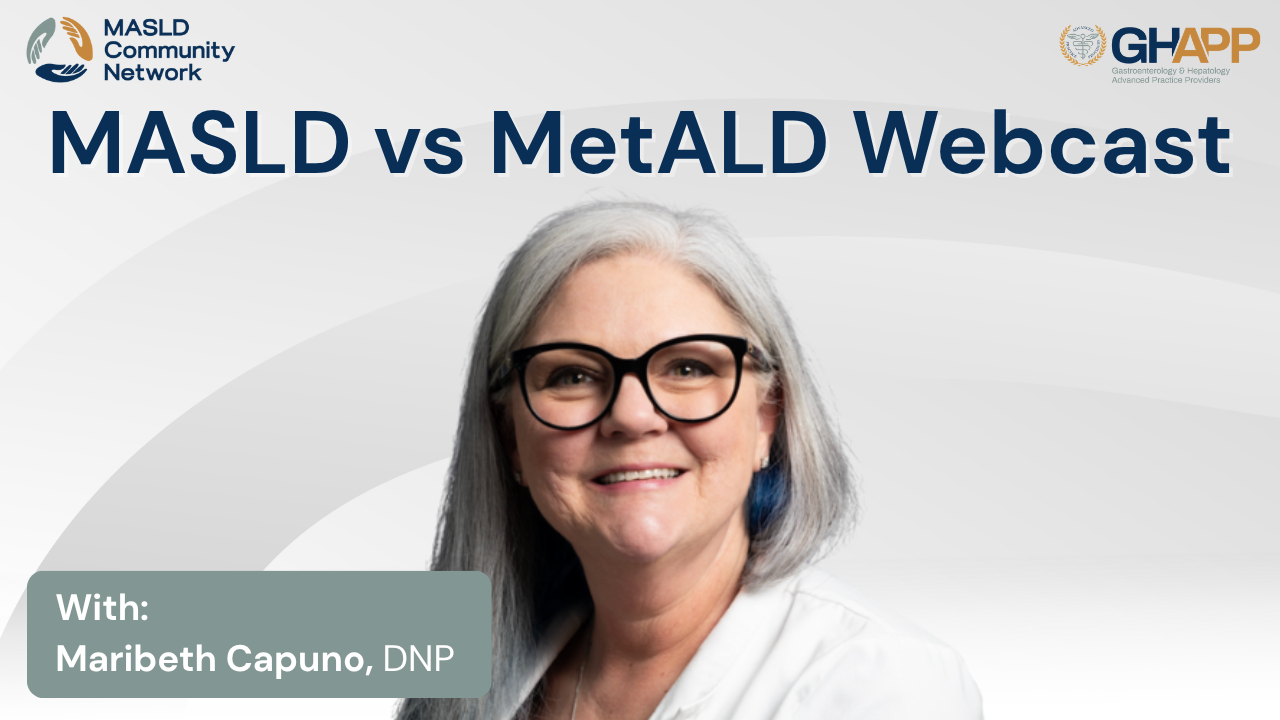
MASLD vs MetALD With Maribeth Capuno

In this case-based talk from the GHAPP MASLD Community Network, Maribeth Capuno, DNP reviews how to differentiate metabolic dysfunction–associated steatotic liver disease (MASLD) from metabolic dysfunction plus alcohol-associated liver disease (MetALD). Using a 52-year-old patient with ultrasound-confirmed steatosis, metabolic risks (PCOS, hypertension, hyperlipidemia, prediabetes), and daily wine intake, she walks through labs and noninvasive testing—FibroScan 11.4 kPa (F3 fibrosis) and CAP 310 (severe steatosis)—plus an objective PEth biomarker of 120 indicating moderate–heavy alcohol use. The session covers the SLD spectrum, “standard drink” counseling, why questionnaires (AUDIT) and biomarkers (PEth) uncover under-reported alcohol use, and how alcohol synergizes with insulin resistance and dyslipidemia to accelerate fibrosis and decompensation risk. Practical management includes Mediterranean-style nutrition, exercise with 5–10% weight-loss goals, strict alcohol cessation, medication considerations for advanced fibrosis, and HCC surveillance in F3 disease. Ideal for APPs and hepatology clinicians, this video delivers step-by-step evaluation, diagnostic criteria, and clear, patient-education talking points to improve MASLD/MetALD assessment and outcomes.
Watch Now
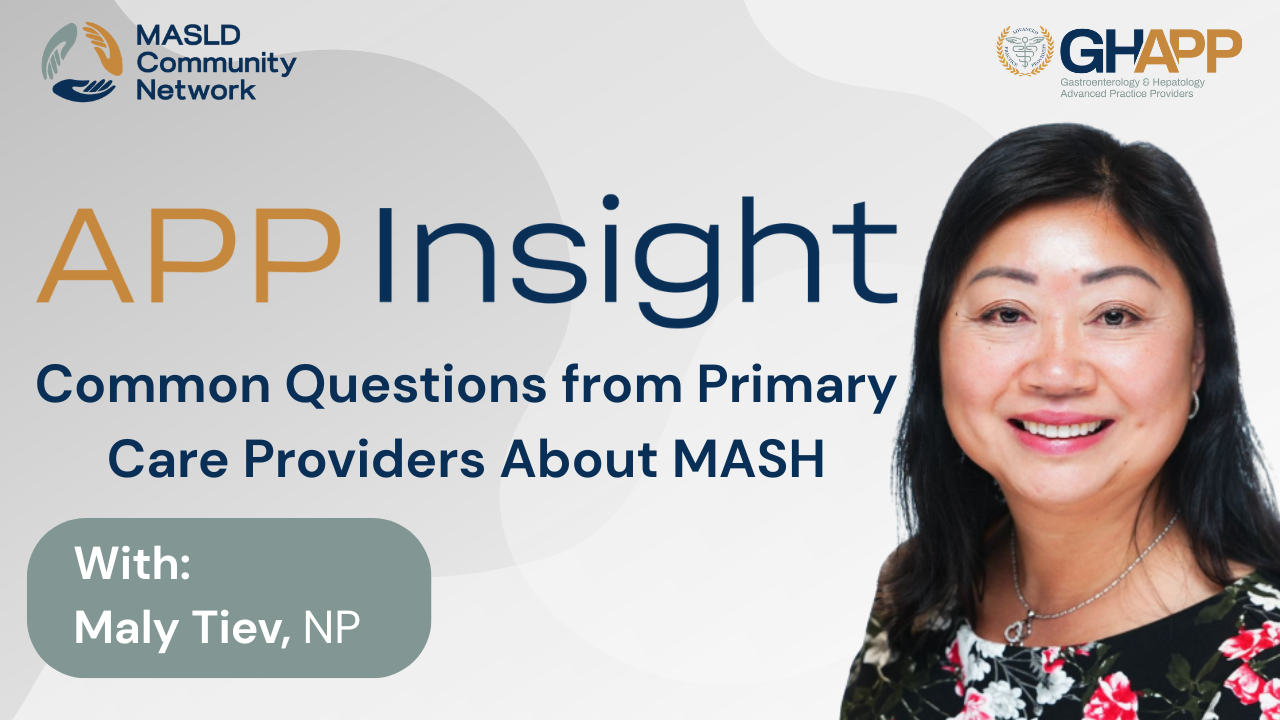
Common Questions From Primary Care Providers About MASH

Join Maly Tiev, NP, NYU Langone Health, as she answers common questions from primary care providers about Metabolic Dysfunction-Associated Steatohepatitis (MASH). Learn who should be screened based on AASLD and American Diabetes Association guidelines, including patients with obesity, pre-diabetes or diabetes, metabolic syndrome, persistent ALT elevation, or steatosis on imaging. Molly explains when to refer MASH patients to gastroenterology or hepatology—such as those with FIB-4 scores over 1.3, suspected advanced fibrosis, or unexplained liver enzyme elevations—and addresses the safety of prescribing statins in MASH. Backed by multiple studies, she emphasizes that statins do not increase liver injury risk and can significantly reduce cardiovascular mortality, the leading cause of death in this population. This session provides practical, evidence-based guidance to help clinicians improve MASH detection, optimize referrals, and manage cardiovascular risk safely.
Watch Now
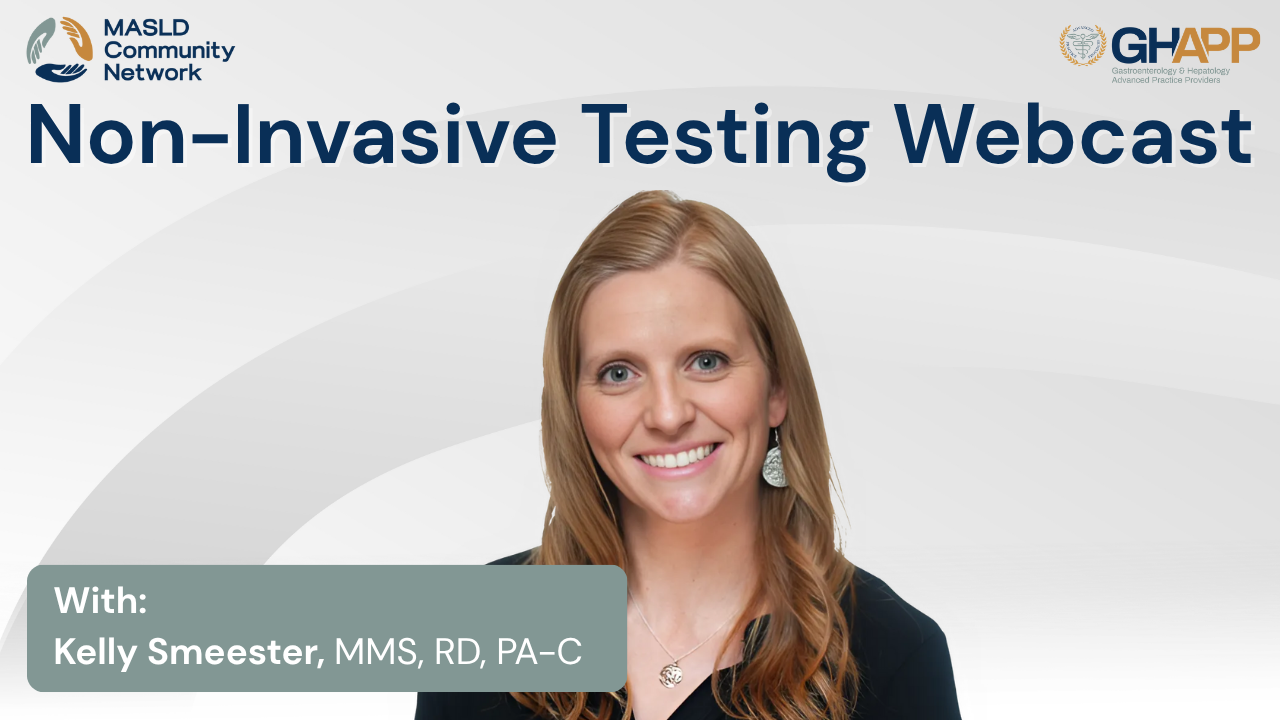
Non-Invasive Testing With Kelly Smeester

Join Kelly Smeester, MMS, RD, PA-C, from South Denver Gastroenterology, for an in-depth discussion on the latest tools and strategies in non-invasive liver disease assessment, presented through the GHAPP MASLD Community Network. This evidence-based session walks viewers through a case study of a patient with Metabolic Dysfunction-Associated Steatotic Liver Disease (MASLD) and explores the full range of non-invasive testing modalities used to evaluate liver fat, stiffness, and fibrosis risk. Kelly breaks down the utility of key tests including FIB-4, ELF Score, FibroScan (VCTE), and MR Elastography, and compares their accuracy, accessibility, limitations, and clinical value. Learn how to interpret biomarkers such as CAP (Controlled Attenuation Parameter) and kPa (Kilopascals), how to navigate indeterminate FIB-4 results, and when to escalate to more advanced imaging like MRE. The session also provides insights into combined scoring models (FAST, MAST, MEFIB), real-world use cases, and how comorbidities and patient-specific factors (BMI, ALT, bilirubin, ascites) can impact test reliability. Whether you're managing early-stage fatty liver disease or advanced fibrosis, this session provides essential knowledge to guide accurate diagnosis, risk stratification, and long-term monitoring without a liver biopsy.
Watch Now

Addressing Health Disparities: Equity Considerations in MASH/MASLD Care

In this powerful and timely episode, Robin Soto, FNP at UC San Diego Health, explores the deep-rooted health disparities impacting patients with MASH (metabolic dysfunction-associated steatohepatitis) and MASLD (metabolic dysfunction-associated steatotic liver disease). With a focus on equity in liver care, Robin highlights the disproportionate burden of disease in Hispanic and underserved populations and the complex interplay of genetics, socioeconomic status, healthcare access, and systemic bias that drives these outcomes. She shares actionable strategies for advanced practice providers (APPs) to implement culturally sensitive communication, bias-conscious screening protocols using tools like FIB-4, NAFLD fibrosis score, and transient elastography, and how to leverage telehealth and community partnerships to bridge gaps in care. Robin also addresses the importance of culturally relevant dietary counseling, inclusive family engagement, and motivational interviewing to enhance adherence and improve long-term outcomes. Whether you're in primary care, hepatology, or community health, this episode offers a roadmap to advance health equity in the management of fatty liver disease.
Watch Now
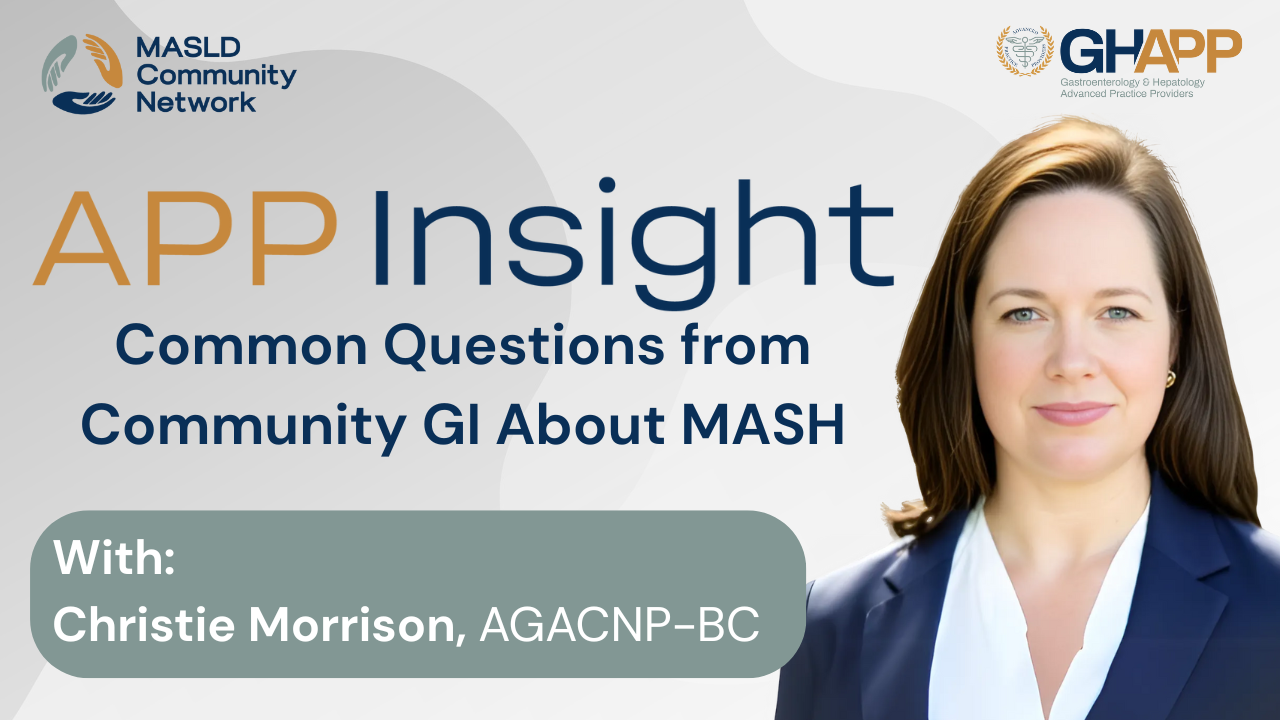
Common Questions from Community GI About MASH

In this insightful video, Christie Morrison, a local advanced practice provider with the GHAPP MASLD/MASH Community Network, answers two of the most frequently asked questions from community GI providers: when to refer patients with MASH to a transplant center and how to evaluate liver fibrosis when FibroScan® isn’t accessible. Christy emphasizes the importance of using non-invasive testing (NITs)—including FIB-4 and ELF (Enhanced Liver Fibrosis) scores—to help identify patients with F3 fibrosis, who are at higher risk for rapid progression to cirrhosis and hepatocellular carcinoma (HCC). She encourages early referral to transplant hepatology to avoid delays in care, especially given long wait times and the value of multidisciplinary support teams at transplant centers. For clinicians without access to FibroScan, Christy shares practical alternatives such as ordering reflex testing to ELF via major labs and leveraging easy-to-use digital tools like MDCalc for FIB-4 calculation. This episode is a valuable resource for GI providers looking to optimize liver care pathways and prevent late-stage complications in MASLD and MASH patients.
Watch Now
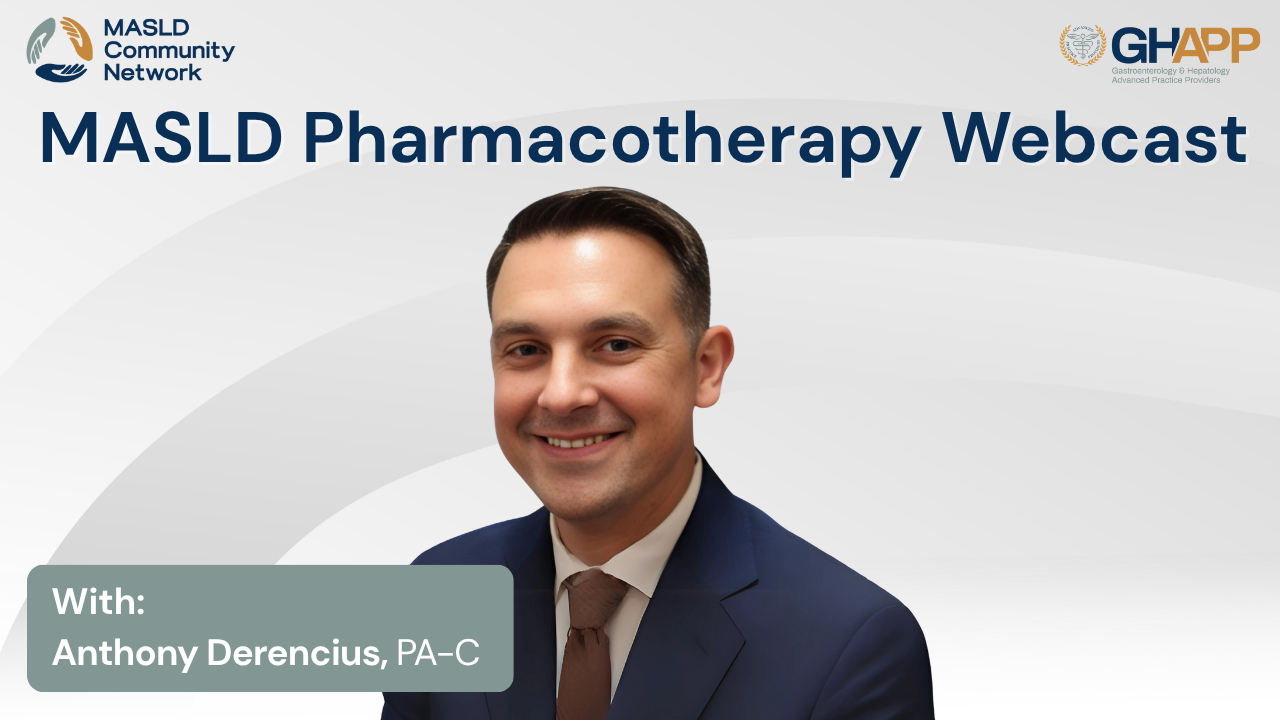
MASLD Pharmacotherapy With Anthony Derencius

Join Anthony Derencius, PA-C, sub-investigator at Pinnacle Clinical Research, for an in-depth, case-based discussion on the pharmacologic management of MASLD (Metabolic Dysfunction-Associated Steatotic Liver Disease) and MASH (Metabolic Steatohepatitis) in this GHAPP MASLD Community Network presentation. With clinical insights from both hepatology practice and research, Anthony explores the multifactorial approach to managing metabolic liver disease—emphasizing weight loss strategies, GLP-1 receptor agonists, cardiovascular risk reduction, and liver-directed therapies. Learn how medications like semaglutide and tirzepatide play a role in weight loss and glycemic control, and how vitamin E and pioglitazone are still considered under specific circumstances. A major highlight includes the mechanism and clinical data behind resmetirom, the first FDA-approved therapy for MASH with F2–F3 fibrosis. Anthony explains its thyroid hormone receptor β-selectivity, efficacy data from the MAESTRO-NASH trial, real-world safety considerations, drug interactions, and monitoring protocols. This presentation is essential viewing for clinicians managing MASLD and MASH in both community and research settings, offering practical strategies, current guidelines, and a look into the future of liver-specific pharmacotherapy.
Watch Now





 September 2025
September 2025 